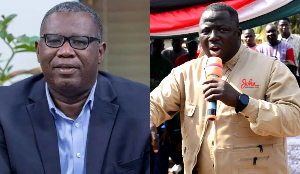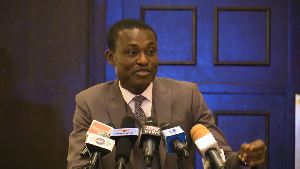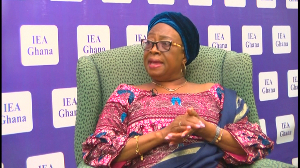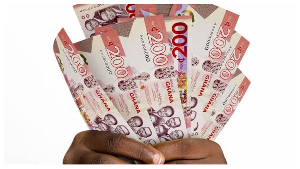....The "Failed Desperation" Of Franklin Cudjoe
Civil societies play significant role in any democratic dispensation with a view of shaping policies for the betterment of the ordinary people. The beauty of civil society groups is their influence on policies and their willingness to offer alternative views to shape critical policies. However, the recent utterances of the Franklin Cudjoe, IMANI, against the energy minister leaves much to be desired. Constructive criticisms on government policies are good but becomes sour when it descends to hatred and personality attacks. His constant attacks on the Minister of Energy, Hon. Emmanuel Armah Kofi Buah lacks basis and substance and for that matter defies the evidences on the ground. Some of us would have preferred to stick to our professional outlook and ignored his seeming partisan comments. However, knowing the facts and turning the blind eye on them are tantamount to disservice to one's professionalism.
Happily, the energy minister's pragmatic measures to addressing the challenges have won the confidence of the president and others over the vile propaganda of the IMANI. Yes, there are electricity generation challenges in Ghana but our analysis of the performance of the energy minister should not be limited to the phenomenon of the"dumsor", "dumsor". As i stated in my earlier articles, it is imperative for the point to be underscored that the power deficit in Ghana is an accumulated challenge passed on to the current government by successive governments.
Exactly a year ago, the total consumption of electricity was 1,670 megawatts but this has jumped to 1,920 megawatts this year. It is therefore implies that we should be adding more than 200 megawatts of electricity every year to be able to match up to the escalating demand. If the previous governments had anticipated this trend, invested adequately in the electricity generation and diversified our energy mix, these unfortunate energy crises as witnessed recently would have been averted in the first place.
However, tremendous strides have been made to bridge the electricity generation shortages in Ghana under the able leadership of the current energy minister, Hon. Emmanuel Armah-Kofi Buah. As an energy analyst who has keen interest in the events in the ministry, I am convinced beyond reasonable that the minister is one of the proactive energy ministers ever. Within a short period in office, he leaves no stone unturned towards resolving the energy deficit in the country. Read below some of the major interventions in the power sector.
The electricity generation sector received a boost towards increasing the generation capacity to 5,000 mega watts. For instance, a total of 660 MW was brought on stream in 2013 alone comprising the completion of a number of projects such as the 132 MW T3 plant at Takoradi, the 400 MW Bui Dam, 2 MW Solar Power at Navrongo and 126MW from Sunon Asogli Plant following the repair works on the West African Gas Pipeline. These have boosted the generation capacity in the power sector in no small measure. Notwithstanding the above achievements, work on additional 320 MW is expected to be completed by the end of 2014. These systematic plans are being implemented to add 1,252 MW and 1,775 MW to the country's generation capacity in 2015 and 2016 respectively.
This will be achieved from "cocktail" of generation sources such as thermal, coal, solar and others. When these projects are accomplished, additional 3,027 MW will be added to the electricity grid making it possible for the country to become net exporter of electricity in the sub-region. Every objective observer would attest to the fact that the phenomenon of the "dumsor, dumsor" has been stabilised in the country over the last three weeks. The shortfall of 250WM, that was the cause of the load shedding, has therefore been restored.
Another sub-sector that receives remarkable successes is rural electrification. In line with the government's policy to achieve universal access to electricity, additional 3200 communities were earmarked for connection to the National Grid. About 2500 communities have already been connected. When the remaining 700 communities are completed by 2016, the current national accessibility rate of 76% will be increased to over 90% making the country the second highest in sub Saharan Africa, after South Africa. An enviable feat under the able leadership of the Energy Minister.
Innovative strategies have been adapted to achieve greater penetration of electricity to off grid communities. To this end, the energy ministry, under Honourable Buah's leadership, has embarked on installation of 21,000 Solar Systems in both households and public institutions such as Police Stations, Health Centres, Schools and other public places. These initiatives have witnessed a great deal of successes in the rural communities. Also worthy of note is the current distribution of 20,000 solar lanterns throughout the country to lakeside communities and other rural areas where there are no electricity access.
In the petroleum sector, the ministry has witnessed landmark achievements in many facets. It is refreshing to point out to Franklin Cudjoe of IMANI that the perennial shortages of LPG in Ghana is now a thing of the past. This is made possible by the recent construction of a 1500 Metric Tonnes of LPG Storage Tank at the Tema Oil Refinery. Therefore Ghana's total output of LPG is projected to increase drastically by the end of this year when Ghana Gas starts commercial production. This will therefore position Ghana as net exporter of LPG in the sub-region in the foreseeable future.
Even though the Ghana Gas Infrastructure Project has been unduly delayed, its final completion in the last quarter of 2014 will guarantee us adequate and constant supply of gas to fuel our thermal generation of electricity sources and enhance regular power supply. This will also reduce more than half the cost of electricity generation in Ghana. Furthermore, the availability of the gas will promote the petrochemical industry, reduce the cost of imported light crude oil and assist to create jobs for the teeming unemployed youth.
In the area of oil contracts, the minister has adapted an open door policy in the award of oil blocks in order to effectively exploit Ghana's Hydrocarbon resources. As a results, several prospective investors have been attracted into the oil sector, resulting to the clearing for the first oil production by Tweneboa, Enyenra and Ntomme (TEN) in the last quarter of 2016. New discoveries such as Sankofa East and Gye Nyame have also been certified which have estimated reserves of about 116 million barrels of oil and 1,110 billion cubic feet of gas. Prospects of oil find in the Volta Basin is promising and schedule to begin this year. It is instructive to note that unlike the Jubilee Field Agreement, the minister has put measures in place to ensure that better terms have been negotiated for Ghana to gain more in the subsequent agreements.
Furthermore, his leadership at the ministry has seen enactment of the local content legislation to improve Ghana's stake in the oil and gas resources. To enhance the skills of Ghanaians, Enterprise Development Centre has been established to train and equip SMEs with the requisite skills to gain competitive urge in the oil and gas industry. Also, an Exploration and Development Bill has been initiated and will be submitted to parliament after cabinet consideration.
As I was assessing these achievements of the Ministry of Energy under the stewardship of Hon. Buah, I got confused as to the criteria the CEO of IMANI used in calling for the removal of the minister. In fact, i am still at a lost as to what his motivations are. On the face of the above stated records, there is no doubt that every independent minded Ghanaian would give the energy minister a great deal of commendation rather than condemnation.
As a key stakeholder in the energy industry, I have been following the ministry with keen interest over the years and I dare say that the minister is one of the most proactive Energy Ministers Ghana has ever produced. The records are available and adduced above to support my assertion. Need I add more? It is my conviction that after bringing these remarkable achievements to his notice, the biased view of Franklin about the energy minister would have been thrown into dustbin.
Franklin Cudjoe's competency argument falls flat and betrays his appreciation of the events in the Ministry of Energy. So to say that the "Energy Minister has failed to initiate any policy guidelines to address the crunching electricity crises" implies that he does not understand the happenings of the energy sector in Ghana. I commend his Excellency, President John Mahama for not pandering to the likes of the CEO of IMANI, Franklin Cudjoe. Once again, i wish to appeal to all "Think Tanks" in the country to engage in constructive criticisms devoid of partisan coloration and insinuations if their inputs into national discourses are to be taken seriously.
Mustapha Iddrisu
Energy Analyst
Takoradi
Opinions of Saturday, 2 August 2014
Columnist: Iddrisu, Mustapha


















